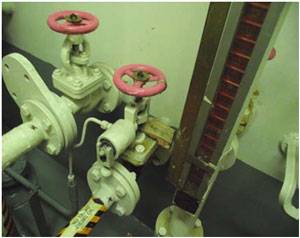USCG Safety Alert: Inspection of Fuel Oil Quick-Closing Valves
U.S. Coast Guard Port State Control Officers (PSCOs) are discovering Fuel Oil Quick-Closing Valves (QCVs) intentionally blocked, modified, and poorly maintained preventing them from operating as designed during an emergency.
QCVs are positive shutoff valves on fuel oil systems serving to isolate fuel tanks in the event of a fire and also prevent “fueling” of a fire in circumstances where system piping and components are compromised. In some circumstances they could be the only means of securing the fuel to a flammable liquid fire. These valves are designed to be remotely operated. Inoperable QCVs create a very serious hazardous condition putting the vessel and its crew at greater risk in the event of a fire.
Blocking or disabling these valves is unacceptable under any circumstance. It is absolutely critical that they operate correctly, are maintained, and ready for use at all times. Proper routine maintenance, and in some cases approved modifications and / or replacement of components may be necessary to ensure reliability of the remote operator and closure of the valve.
Owners /operators, vessel engineers, PSCOs, Class society and other machinery space inspection personnel must fully understand the critical nature and importance of QCVs and associated systems. Crewmember knowledge of testing, operation, maintenance and repair, in addition to related documentation and required spare parts are essential elements to evaluate during an inspection. International regulations require that positive shutoff valves located outside the fuel tank be capable of being closed from a safe position from outside the space concerned.
The U.S. Coast Guard strongly recommends that owners /operators, vessel engineers, PSCOs, Class society and other machinery space inspection personnel ensure:
a) The QCV operating system is capable of remotely closing all valves as designed; some systems close valves sequentially and others simultaneously.
b) There is a maintenance plan in place including technical manuals containing diagrams and information that describe the system components, required spare parts, operation, maintenance and repair.
c) That all engine department personnel can identify the location of each valve, the respective remote closure and how to close them locally and remotely in an emergency.
Note: During Coast Guard PSC Exams, vessel engineers should be able to explain maintenance requirements of the system, and provide operational test and maintenance records. Engineers should be able to describe how test the valves, reset them after closure, and understand their operational importance. Vessels with inoperable QCVs may be subject to an operational control.
This safety alert is provided for informational purposes only and does not relieve any domestic or international safety, operational or material requirement. Developed by the Office of Foreign and Offshore Vessel Compliance Division (CG-5432), United States Coast Guard Headquarters, Washington, DC.











